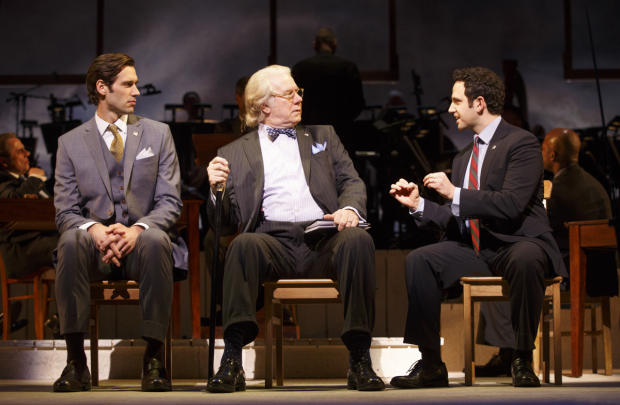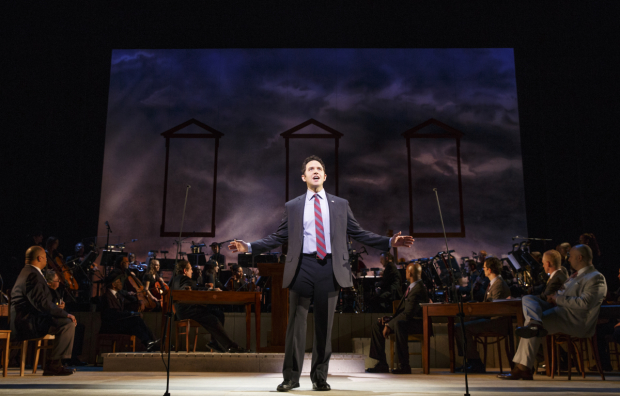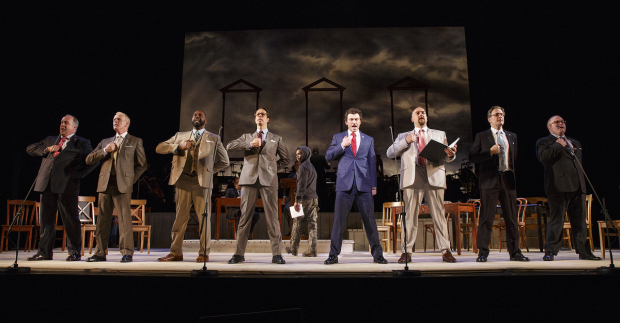1776
Encores! takes a dramatic twist with this presentation of the 1969 Tony Award winner for Best Musical.

(© Joan Marcus)
If you think the rhetoric of this election year is particularly nasty, check out the Encores! presentation of Sherman Edwards and Peter Stone’s 1776 at New York City Center. This superb concert production of a somewhat lackluster musical (but better play) may help you realize that it was ever thus in our great American experiment.
Politics aside, 1776 is an unlikely choice for Encores!, a series that emphasizes the symphonic qualities of old Broadway shows. There is nothing particularly remarkable about Sherman Edwards’ workmanlike score: The music is unmemorable and the lyrics, which rely too much on grandfatherly wordplay (pens in Pennsylvania), are memorable for all the wrong reasons. Also, the third scene features one of the longest stretches of uninterrupted speaking (nearly 30 minutes) in the American musical theater. One suspects that 1776 would not have reappeared were Broadway not currently in the grips of HamiltonMania.
1776 takes places largely before the events of that blockbuster musical, during a time when a teenage Alexander Hamilton led an artillery company in New York and Captain Aaron Burr had just returned home from a disastrous invasion of Canada (under the command of Colonel Benedict Arnold). The show opens with John Adams (Santino Fontana) urging the continental congress to vote for independence. His compatriot Ben Franklin (a funny, but never goofy John Larroquette) suggests that another messenger might do the trick, specifically Virginian Richard Henry Lee (Jubilant Sykes, living up to his name). Virginia motions for independence, but Pennsylvanian loyalist John Dickinson (Bryce Pinkham) scuttles the vote by moving that any independence resolution should be adopted unanimously. Congressional President John Hancock (Michael McCormick) agrees, leading Adams to move to adjourn until Thomas Jefferson (John Behlmann) can write a formal Declaration of Independence. It looks like a lost cause: The congress cannot seem to agree on anything…and they don’t even touch the slavery issue until the second act.
If it all sounds like a musical version of 18th-century C-SPAN, I assure you, it’s so much more thrilling. Under the direction of Garry Hynes, Peter Stone’s extended book scenes come alive, so much so that we often forget we are at a concert presentation.
That’s not to say the music doesn’t work. As conducted by Ben Whiteley, the Encores! orchestra sounds radiant as ever, delighting us with Eddie Sauter’s rich orchestrations (including the prominent use of harpsichord and a full French horn section). But unlike most musicals, the score is really not the main course. As Hamilton composer Lin-Manuel Miranda notes in an interview in the program, “you long to see them talk to each other. Which almost never happens in a musical.”
This version of 1776 takes a page from Hamilton by featuring a multiethnic cast (the original production was exclusively white). The result is somewhat less revelatory. While “The Lees of Old Virginia” takes on new meaning when sung by a black actor (unquestionably, many of the real first families of Virginia were African-American), Hynes does little else with the opportunity of having performers of color take ownership of these historically white roles.

(© Joan Marcus)
The one major exception is John-Michael Lyles, who plays a bedraggled courier from General Washington. His loose hoodie and camo pants contrast highly with the expensive suits worn by the delegates. His accusatory stare lets us know what class of Americans is actually fighting this war as these gentlemen in Philadelphia endlessly debate. Lyles closes the first act with an absolutely haunting rendition of “Momma, Look Sharp,” certain to make even the most patriotic reflect on two centuries of American militarism.
Smartly, Terese Wadden costumes the show in the present. The delegates wear the standard Washington power look: lapel pins and conservative tie patterns. Original political wife Abigail Adams (the powerful Christiane Noll) wears a puffy vest over plaid, a look that is seemingly inspired by the cover shoot for Sarah Palin’s memoir.
As Dickinson, Pinkham dons a well-tailored blue suit that wouldn’t look out of place on Wall Street, perfect for this representative of moneyed America. He leads the minuet “Cool, Cool Considerate Men” with a pronounced sneer and elegant restraint, reaching a well-earned crescendo on his explanation for why the nonwealthy majority will rally to his side: “Most men with nothing would rather protect the possibility of becoming rich than face the reality of being poor.”

(© Joan Marcus)
This conservative crusader has a worthy foil in Fontanta’s firebrand Adams. From the earliest moments, his trumpetlike voice sounds the call for independence. “Vote yes,” he sings with a glorious vibrato. Fontana easily embodies the “obnoxious and disliked” Adams, carrying vast swathes of the show with his pugnacious charisma.
It is Alexander Gemignani as South Carolina representative Edward Rutledge, however, who really stops the show with “Molasses to Rum,” the most daring number in the score. Gemignani’s resonant baritone reinforces the song’s satanic quality: He endows the delegates with the awful knowledge of the triangle trade that fuels the colonial economy, tempting them to commit our nation’s original sin, the official toleration of chattel slavery.
While there are aspects of 1776 that don’t seem to mesh with reality (Behlmann’s stoic, furtive Jefferson gives us no sense of the raging egomaniac that actually was), it is more truthful than not and certainly gets us thinking about the foundational battles of our union, some that continue to be waged to this day: As Adams is forced to compromise his ideals in order to pass his resolution, we cannot help but think about the ideologues currently running for the highest office in the land, who, should they be elected, will undoubtedly disappoint their voters by walking back their many campaign promises.









